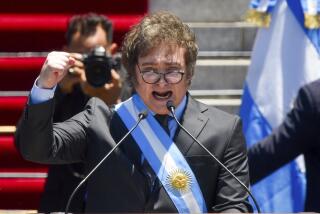Reagan Should Listen
- Share via
Argentine President Raul Alfonsin’s visit to the United States got off to a jarring start last week when President Reagan used the welcoming ceremony to verbally attack the government of Nicaragua, citing Alfonsin’s election in 1983 as a democratic counterpoint to the Marxist system being created by the Sandinistas. For his part, Alfonsin stressed the need for dialogue in Central America and asked for more help for heavily indebted Latin nations like Argentina.
The stark contrast--Reagan obsessed with a small nation of 3 million people while the leader of a giant country of 30 million asks for understanding--underscored the distorted perspective that the Reagan Administration has when it looks south of the Rio Grande.
Alfonsin has been struggling for more than a year with the toughest political problem that an Argentine president has ever faced. He was left a foreign debt of more than $45 billion by the corrupt and brutal military governments that ran the country for seven years before he was elected. To pay the money back, Argentina needs help from the International Monetary Fund, which demands severe austerity measures before it approves financial aid.
Alfonsin is trying to impose austerity, but too much of it could be political suicide for him. He is faced with opposition by a powerful labor-union movement, allied with rival political parties like that of the Peronists. Union leaders are threatening to take their followers into the streets if the government reduces the wages and benefits that they have grown used to since Argentine dictator Juan Peron’s heyday. If that happens, the generals may seize power again on the grounds that only the military can ensure political tranquility.
International bankers cannot always appreciate political problems like Alfonsin’s, but other government leaders must. That is why Alfonsin told a joint session of Congress on Wednesday that “the foreign debt of our countries is a political fact that demands responsible cooperation of governments to find . . . security in the world economic order.”
Too often in recent months U.S. officials have given lip service to the emergence of new democratic governments in Latin America, including Alfonsin’s, but have done little to help them through the profound economic crisis now wracking the region. The United States provided a $500-million bridge loan to Argentina last year to help it reach a temporary agreement with the monetary fund. But many more substantial gestures are going to be needed if Argentina and the other Latin debtors--including Mexico, Brazil and Peru--are to handle their financial problems safely and peacefully. This country must be prepared to provide additional short-term loans when key debtor nations need them, and U.S. officials must use their influence with the monetary fund, the World Bank and other international lenders to make sure that no debtor nation is forced to adopt more austerity than it can handle politically.
Helping the Latin American debtors, especially fragile new democratic governments like Argentina’s and Brazil’s, out of the treacherous situation that they are facing will be a long, complicated process. It will demand close attention by the State Department’s financial and political experts. That makes it all the more frustrating to see the Administration focusing so much time and energy these days on Central America.
Alfonsin’s advice on that subject echoed the sentiments of every major Latin American leader with whom Reagan has met since he took office five years ago: The solution to the region’s revolutionary turmoil is not military, but political. And, like many other Latin Americans, Alfonsin sees the best forum in which to hammer out a political solution to the Central American crisis as the Contadora process--the long effort by Mexico, Venezuela, Colombia and Panama to write a peace treaty for the five Central American nations. In private meetings Alfonsin warned Reagan against military intervention in Central America by the United States and other outside powers, and told him that the CIA’s campaign against the Sandinista government is a mistake.
For a variety of historic reasons, Argentina and the United States have never been the best of friends. But Alfonsin’s visit could open a new era in the relationship--if Reagan listens to the sound advice that Alfonsin gave him on the Latin debt problem and on Central America.
More to Read
Sign up for Essential California
The most important California stories and recommendations in your inbox every morning.
You may occasionally receive promotional content from the Los Angeles Times.













